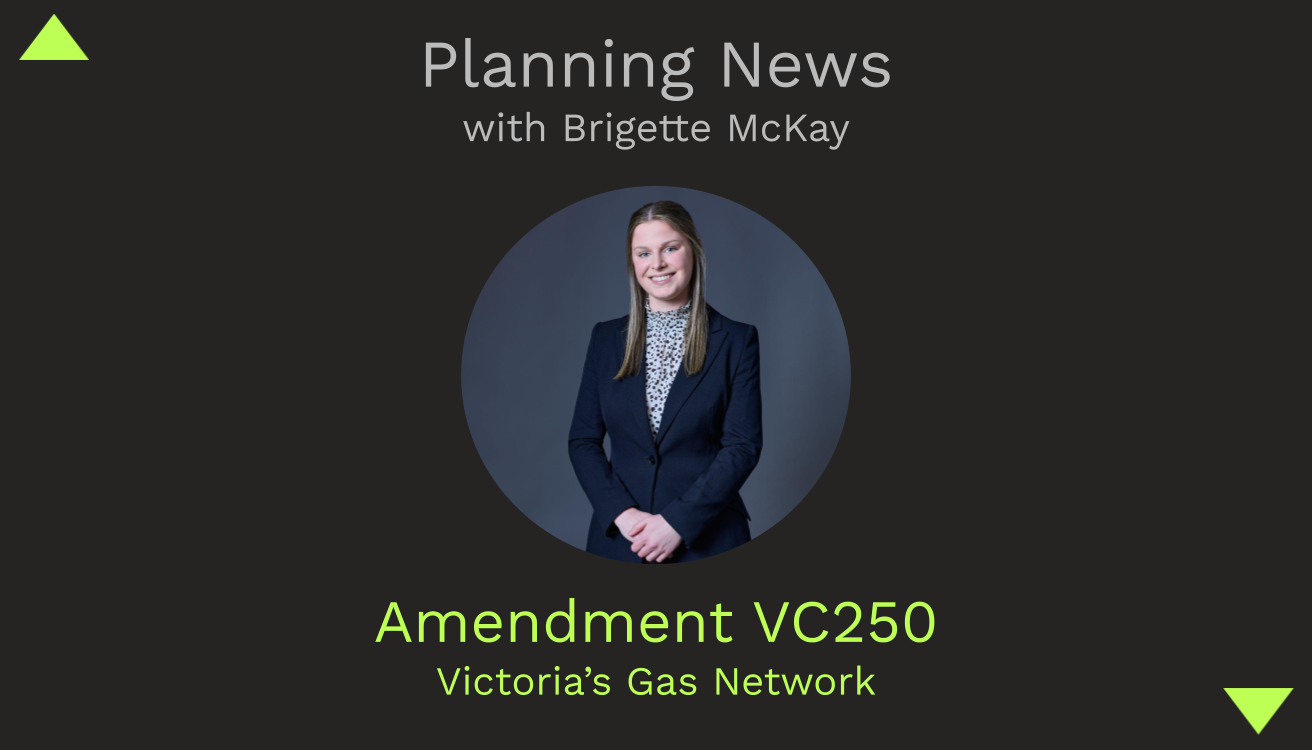
AMENDMENT VC250: WHAT’S HAPPENING WITH VICTORIA’S GAS?
The Victorian State Government has joined the global drive to be net zero by 2045, with an emissions reduction timeline resembling that of the Paris Agreement. As part of this drive, certain new developments can no longer be hooked up to the gas network. UPco Planner Brigette McKay gives us a rundown of this shift away from gas, and how it will impact development now and into the future.

Firstly, why the ban on gas?
With the energy sector contributing most of the world’s greenhouse gas emissions,[1] it makes sense to hone in on a cleaner energy supply. And because gas is mostly methane (which is a greenhouse gas), we won’t be able to get to net zero if we continue to use it.
So, the State Government released its Gas Substitution Roadmap in 2022 to phase out the use of natural gas. There have been a few recent energy-focused Government initiatives, like the Victorian Energy Upgrades (installing energy-efficient products) and the Solar Homes Program (encouraging the switch to solar power).
But with 80% of new homes still being connected to the gas network,[2] the Minister for Planning has approved Amendment VC250 to steer us away from powering the State with fossil fuels.
Tell us a little about Amendment VC250…
As part of Amendment VC250, the Minister for Planning introduced Clause 53.03 (Residential Reticulated Gas Service Connection), which took effect on 1 January 2024. It applies to any fresh permit applications for brand-new residential developments.
So, when does Clause 53.03 apply? And to what developments?
It applies to residential developments, for instance:
- new homes (other than a caretaker’s house)
- new apartment developments
- land subdivisions, where at least one of the new lots will be residential.
And how about mixed used developments?
Consistent with the residential focus of Amendment VC250, it’s our view that the prohibition only applies to any residential component of a mixed use development.
When does it not apply?
It won’t apply if the planning permit application is for:
- altering or extending an existing residential development
- subdividing, where each lot contains an existing residence or one that’s been issued a permit.
Naturally, for residential developments that don’t require a planning permit, Clause 53.03 won’t apply – but local and State planning policies still support the movement away from the gas network.
What about applications lodged before 1 January 2024?
For anyone who applied for a permit with the intention of connecting to the gas network, no need to panic! Clause 53.03 won’t apply – unless, for any reason, the application needs to be withdrawn and resubmitted.
What will the gas prohibition look like on a permit?
If a responsible authority (like a council) grants a permit to which Clause 53.03 applies, a mandatory permit condition will be used to prohibit gas connection.
It won’t impact any existing bushfire provisions.
So, what do you think about Amendment VC250? Any idea about what the future holds?
Any regulatory change that has the potential to generate a positive environmental outcome for the State (and hopefully save Victorians some money in the process![3]) is welcome. And housing may be just the first step. It’s possible we’ll start seeing changes in the commercial and industrial sectors in good time – pushing us closer to that net zero target.
If you’d like to know more about how Amendment VC250 will affect your development, drop us a line at info@upco.com.au
[1] https://www.un.org/en/climatechange/net-zero-coalition
[2] https://www.planning.vic.gov.au/guides-and-resources/strategies-and-initiatives/victorias-gas-substitution-roadmap
[3] https://stfpbsprodapp01.blob.core.windows.net/amendmentfiles/70a2da95-7a6c-ee11-9ae7-002248933fc5_c5cc3af9-4977-4910-91f6-40cafa5fda90_VC250%20Explanatory%20Report%20Approval%20Gazetted.pdf
